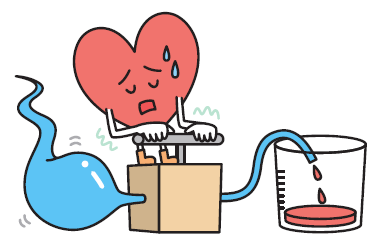|
Our heart becomes smaller and harder with aging. The muscles of the heart become hard, causing the heart not to move well. That causes shortness of breath by going up stairs a little bit or makes easy to get tired. If it gets worse, serious heart failure happens, which causes sudden death.
The substance making our heart soft is SOD (Superoxide dismutase) which is a type of enzyme in our body is an enzyme that repairs cells and reduces the damage done to them by superoxide, the most common free radical in the body. So if you can secrete SOD a lot, you can keep your heart soft. According to 10 years of a research, the death rate due to heart failure among the people who secrete a lot of SOD was one sixth of the people who didn’t secrete SOD very well. The heart starts becoming hard from the age of 30s. If the muscle of the heart becomes hard, the amount of blood pumped out by one pulsation decreases so the amount of blood delivered to the body always becomes short. Blood contains oxygen and nutrition which are required to maintain life. The decrease of delivered blood causes lack of oxygen and nutrition in the whole body, resulting in shortness of breath, fatigue or in the worst case, sudden death due to heart failure. The amount of blood pumped out from the heart is 7000 liters (35 steel drums) per day. If the heart is hard, the amount of blood pumped out from the heart decreases by 1/3 (about 12 steel drums). According to a research in National Institute of Aging in US, as a result of measurement of SOD in some kinds of mammalians including human, the more SOD is, the longer life span is. The amount of SOD of various animals were examined. Shiba Inu (dog): 1.6 (Average life span:14 years) Munchkin (cat): 3.1 (15 years) Monkey: 5.7 (30 years) Horse: 4.4 (25 years) Mouse: 0.5 (3 years) Human: 6.2 (80 years) The above shows the relationship between heart and life span. The number that the heart can pulsate in a lifetime is limited. The number of pulsation in a lifetime is one billion times. In the case of a mouse, 600 times/minute x 3 years = 1 billion times. In the case of a dog, 120 times/minute x 15 years = 1 billion times. If this law is applied to the human, 70 times/minute x 30 years = 1 billion times. We are supposed to live only for 30 years. There is difference of 50 years, compared to actual life span. This difference is brought by more plentiful amount of SOD than other animals. The amount of human’s SOD is richer than other animals, but it starts to decrease rapidly from the age of 40. Therefore, it is important to increase SOD in order to keep the heart elastic. People who live in a town where are a lot of hills are rich in SOD. It is considered that placing a load on the muscles by walking on a hill leads to the secretion of a lot of SOD. To increase SOD, it is important to walk on hills and stairs. The point is climbing up and down stairs slowly. The slower you climb up and down stairs, the more you can place a load on the muscles.
0 Comments
Leave a Reply. |
IchiroThis Blog is for a memo of my clinical realizations, information about health I have learned recently and update information. Archives
April 2024
Categories
All
|

 RSS Feed
RSS Feed